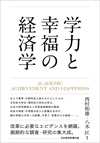-

-
Author(s)/Editor(s) Written and edited by NISHIMURA Kazuo and YAGI Tadashi Publisher Nikkei BP ISBN 978-4-296-11872-4 Publication Date April 2024
Table of Contents
The evidence necessary for reform is covered in this publication which thoroughly elucidates what education is necessary for acquiring the ability to live well.
This work is the culmination of groundbreaking research and studies that have been conducted over the past 40 years and on surveys and analyses of various causal relationships, based on a sense of crisis over the educational lapse that has occurred, in order to elucidate the relationship between Japanese education and academic achievement, the sense of happiness and the effects of discipline on students. It covers various topics, including what "Yutori" education and entrance examinations for a small number of subjects have brought about, the academic achievement of university students who major in humanities and STEM, the relationship between the number of patent applications by Japanese people and the Courses of Study, the effect of subject strengths and weaknesses on income, the effect of parents' educational background on their children, and even methods of successful parenting for children and tips on how to communicate with them.
Part I. The Reality of Declining Academic Achievement
Chapter 1: The Deteriorating Mathematical Skills of Japanese University Students
Chapter 2: More Serious Decline in Academic Achievement in the Sciences
Chapter 3: R&D Capability Weakened by “Yutori” Education
Part II. Schooling has Greater Effects on Life Than Expected
Chapter 4: Higher Incomes for People Who Can Do Math - a comparison of income between student expertise in subjects and later income
Chapter 5: Education Policies That Have Increased Disparities
Chapter 6: STEM Majors are Paid More than Humanities majors
Chapter 7: Can Physics Lovers Work Well?
Chapter 8: Diversification of Admissions Systems Failed to Produce Excellent Workers
Part III. What Family Education Increases Happiness?
Chapter 9: Four Disciplines for Societal Success
Chapter 10: Parenting Style Affects Income Formation, Happiness, and Educational Attainment up to This Point
Chapter 11: How to Praise and Scold for Optimal Child Development
Chapter 12: Self-Determined People Are Happier
Part IV. Elucidating the Mechanisms of Thought and Action
Chapter 13: What Motivates People: Behavioral Change and Prosocial Decision Making
Chapter 14: Differences in Thinking Types Affect the Formation of Work and Learning Competencies
Conclusion: Practice in Education

